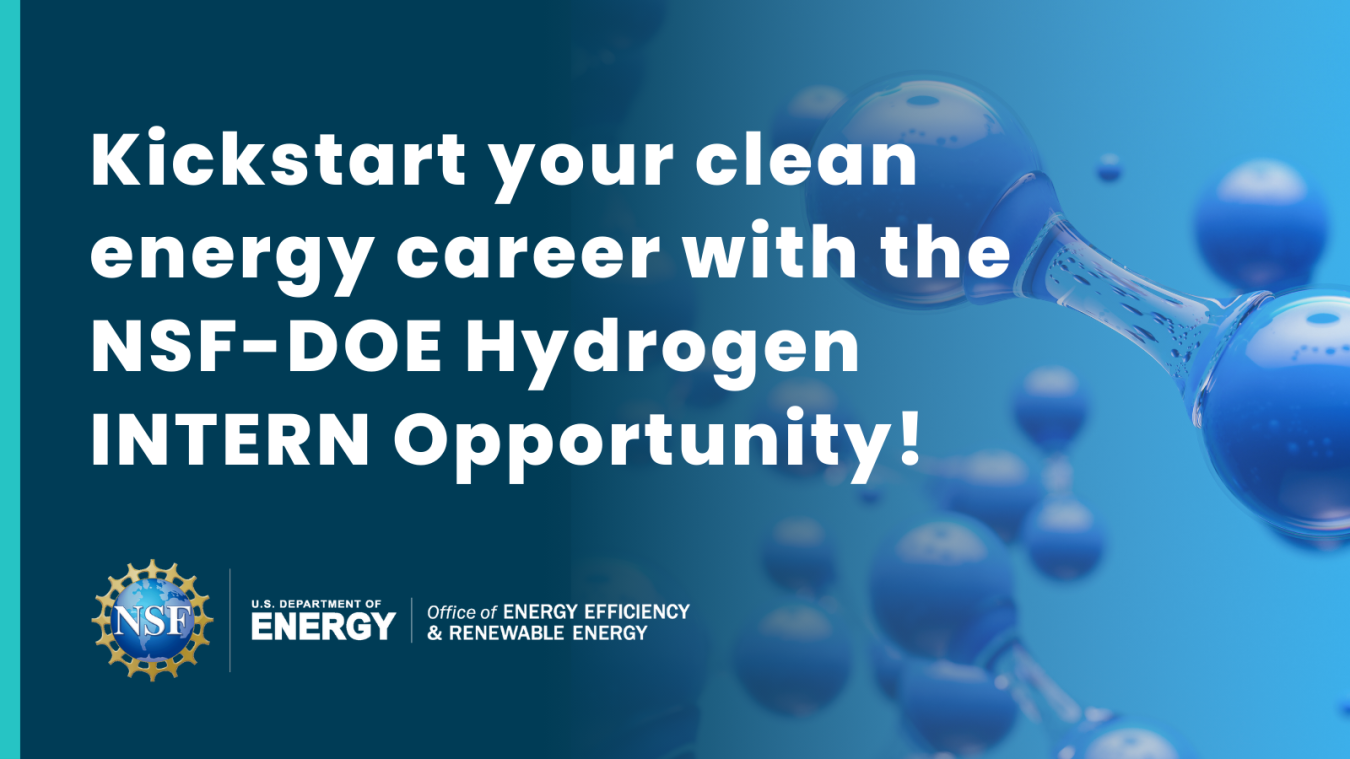The Hydrogen INTERN program will support up to 10 six-month research internships per year for graduate students interested in professional development and training for careers that support the emerging clean hydrogen economy.
Hydrogen and Fuel Cell Technologies Office
May 30, 2024
Today, the U.S. Department of Energy's (DOE's) Office of Energy Efficiency and Renewable Energy (EERE) and the National Science Foundation (NSF) announced a new internship program to support workforce development goals outlined in the U.S. National Clean Hydrogen Strategy and Roadmap. This new Hydrogen INTERN collaboration is funded by EERE's Hydrogen and Fuel Cell Technologies Office (HFTO) as part of NSF's Non-Academic Research Internships for Graduate Students (NSF INTERN) program. The program will support up to 10 six-month research internships per year for graduate students involved in active NSF grants, who are interested in professional development and training for careers that support the emerging clean hydrogen economy.
"We are thrilled to see Hydrogen INTERN come to life," said HFTO Director and DOE Hydrogen Program Coordinator Dr. Sunita Satyapal. "Equipping the next generation of clean hydrogen professionals with real-world experience and perspective is crucial, given the industry's growth projections over the coming decades."
Hydrogen will be an essential tool to address hard-to-decarbonize sectors of the economy such as heavy transportation, industrial and chemical processes, and production of liquid fuels and fertilizers. As outlined in the Strategy and Roadmap, production of clean hydrogen in the United States could reach 10 million metric tons (MMT) per year by 2030 and 50 MMT per year by 2050. A skilled workforce will be needed throughout the lifecycle of hydrogen technologies—from research, development, and demonstration (RD&D) to deployment, operations, maintenance, and decommissioning—and across the entire hydrogen value chain, including the production, delivery, storage, and use of hydrogen.
"This NSF-DOE opportunity for hydrogen and fuel cell technology research and professional development will prepare graduate students for diverse careers in hydrogen energy and help spur U.S. growth in clean energy," said Susan Margulies, NSF assistant director for engineering.
"The burgeoning hydrogen sector is creating a multitude of high-quality jobs—from R&D and engineering to facility management, community engagement, and more," said Terrence Mosley, EERE senior advisor for diversity and STEM. "This exciting new internship program in partnership with NSF demonstrates EERE's commitment to exposing students to clean energy careers, while providing them with the experience and resources they need to succeed."
Hydrogen INTERN complements academic training, enhances preparation of graduate students for multiple career paths, and encourages participation across a full spectrum of diverse talent in science, technology, engineering, and mathematics. Graduate students involved in active NSF-funded projects are eligible; applications are submitted by a faculty member serving as principal investigator of an NSF award. Interested students should speak with their advisor, who will then contact NSF to submit a supplement to their parent award.
Selectees will receive $55,000 over the course of an internship and will be offered a range of placement options, including within industry, non-profit organizations, national laboratories, other government agencies or laboratories, and any other settings outside of academia.
"Hydrogen INTERN will provide geoscience-focused graduate students with a unique opportunity to expand their skillset, join the cutting-edge field of hydrogen exploration, and explore clean energy solutions. We are very excited to support this activity," said Alexandra Isern, NSF assistant director for geosciences.
Established in 2017, NSF INTERN provides graduate students with six-month experiential learning opportunities through research internships where they acquire core professional competencies and skills working on-site at a non-academic host organization. NSF INTERN is coordinated through the NSF-DOE Memorandum of Understanding signed in March 2022, which aims to formalize the agencies' longstanding partnership on scientific and engineering research to bolster national energy policy.
Read more about NSF's INTERN program.

